Sep 24, 2025 – Religious Leaders’ Meeting, Weekly Dharma Assembly, Peace Research Seminar
Hello. Today is the day for the monthly religious leaders’ meeting for national reconciliation and peace, as well as the Weekly Dharma Assembly where Jungto Society members examine their practice.
Sunim departed from Dubuk Jungto Retreat Center at 2 AM to head to Seoul for the religious leaders’ meeting. After driving for 4 hours and 30 minutes, he arrived at the Jungto Social and Cultural Center at 6:30 AM. As Sunim arrived, pastors, priests, bishops, and other religious leaders also arrived one by one at the basement dining hall.
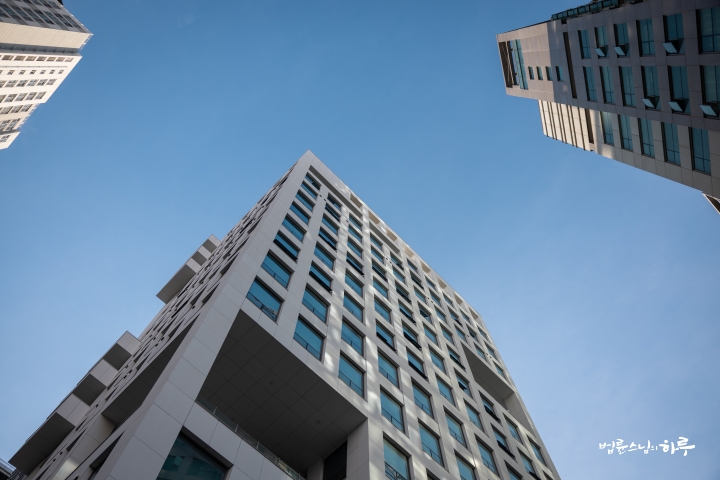
After having breakfast prepared with care by The Peace Foundation staff, they moved to The Peace Foundation conference room to have a conversation.
Sunim boiled chestnuts he had gathered yesterday at the Dubuk Retreat Center farm and shared them with the religious leaders.
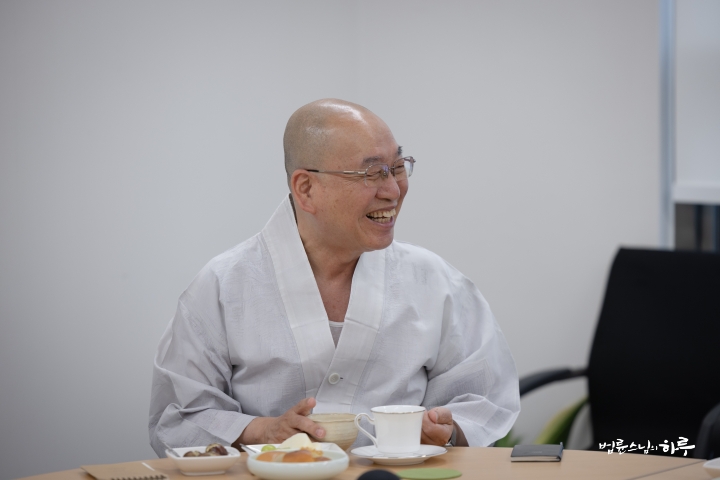
“I brought some chestnuts from the countryside. Please try them. They’re fresh chestnuts.”
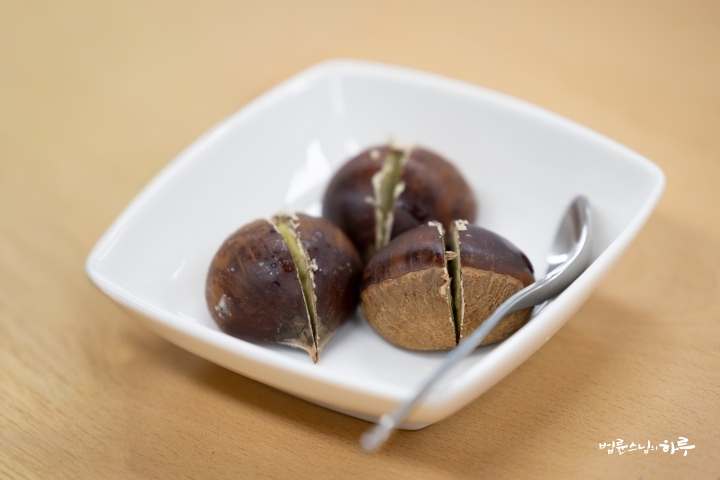
Everyone was delighted, saying the chestnuts were very large and delicious. Even after eating just three, they felt full. After tasting the chestnuts, Park Nam-soo said:
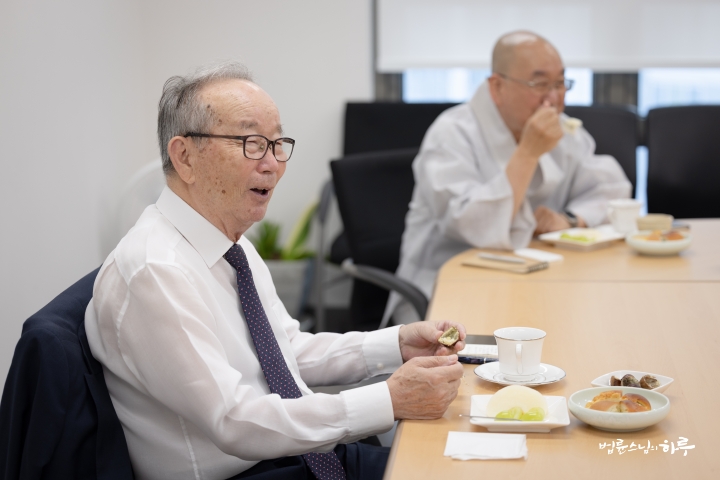
“Right now, we’re not eating chestnuts, we’re eating autumn.” (Laughter)
Everyone laughed together, saying it was like reciting a line of poetry.
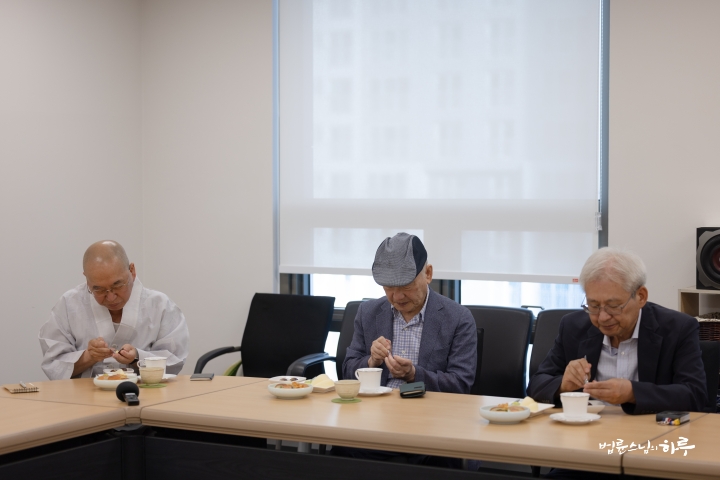
They then had a serious discussion about peace on the Korean Peninsula and national unity, freely talking about issues reported in the media over the past month. The religious leaders expressed concern about the situation where conflicts between the ruling and opposition parties have intensified even after the new government took office. Sunim first expressed his concerns about the current domestic political situation.
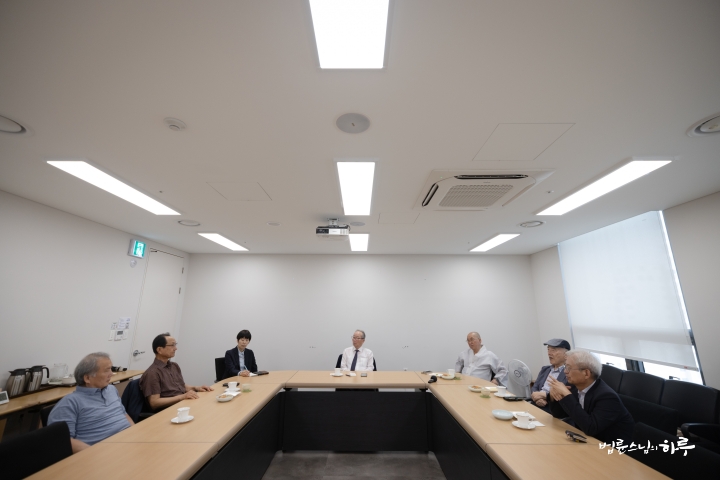
“I’m worried that the current government’s ‘eradication of insurrection’ might deteriorate into political disputes like the Moon Jae-in government’s ‘clearing of deep-rooted evils,’ foolishly reviving the insurrectionist forces instead. That’s why I’ve advised ruling party politicians several times when meeting them that ‘rather than dragging this out, they should resolve it quickly and now move toward the path of reconciliation.'”
Why the Deepening Conflicts in Domestic Politics Are Concerning
However, looking at media reports, politicians’ words and actions still seem to remain at the level of street thugs. If this situation continues, the original meaning of ‘eradication of insurrection’ will disappear for the people, leaving only the image of two forces fighting. Especially seeing attacks on the judiciary, I’m increasingly concerned that they might lose support from the moderate voters. While foreign affairs are being handled relatively well, domestic politics are being managed far too foolishly.”
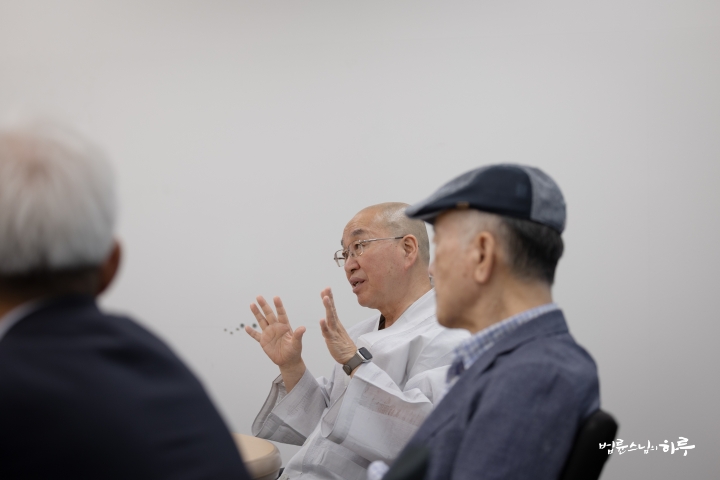
The religious leaders agreed with Sunim’s opinion and said:
“Since they’re not attacking with clear evidence, the opposition resists even more fiercely, and in doing so, they end up strengthening their opponents. So if they get public attention, they’ll receive party nominations for the National Assembly next time, and it will be advantageous when opening a law practice.”
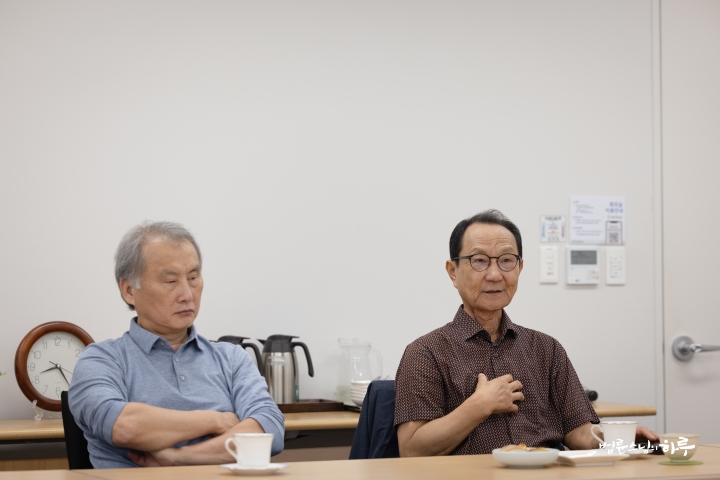
“That’s right. They seem to think they need to make strong statements to continue making their presence known.”
“What’s more worrying is that as the ruling and opposition parties fight domestically, we can’t properly respond to the major changes in international order triggered by President Trump. Seeing the strengthening alliance between North Korea, China, and Russia, I’m concerned that peace on the Korean Peninsula might become distant.”
After listening carefully to the religious leaders’ opinions, Sunim emphasized that politicians from both parties need to broaden their perspective to changes in the international order.
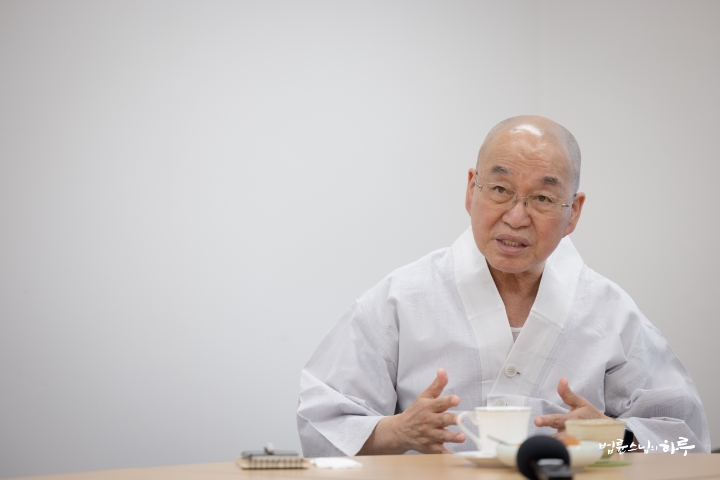
“If we think about the interests of the nation and people, we need to embrace conservatives within the framework of ‘patriotism.’ Eliminating opponents through eradication of insurrection shouldn’t be the core focus. The key isn’t clearing the past but how to pursue future interests. While major participants in insurrection should be boldly punished, for the rest, we need to embrace them within the framework of patriotism for future interests. To properly respond to external pressure in the rapidly changing international order, progressive forces alone are insufficient. It’s difficult to respond to American pressure when national opinion is divided. We need to embrace conservative forces to have the power to respond to external pressure. We shouldn’t just look domestically but must respond while also considering changes in the international order, but such wisdom seems to be lacking.”
Bishop Park Kyung-jo agreed with Sunim’s words and said:
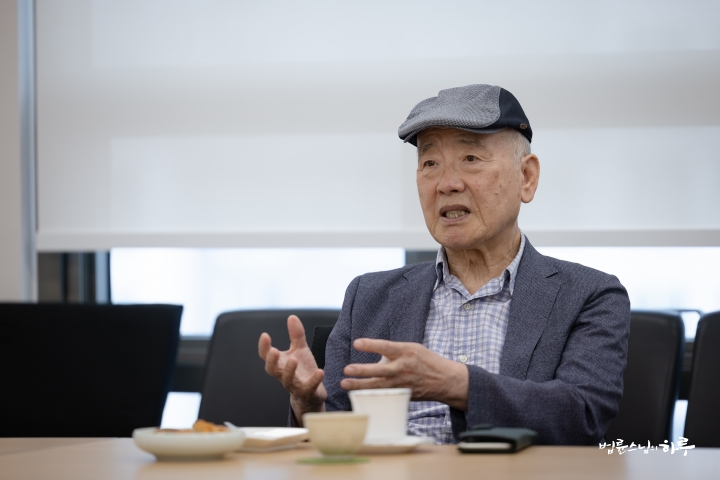
“It seems like the power coming from mutual hatred is out of control.”
Finally, Sunim also talked about concerns regarding constitutional amendment.
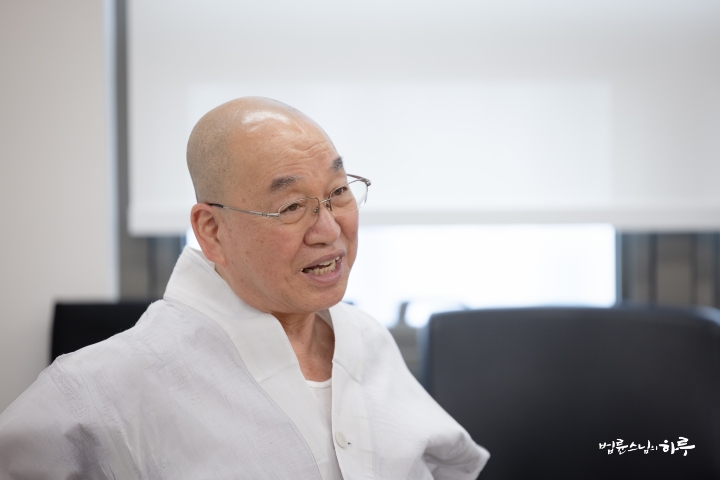
“The constitutional amendment that the current government has announced it will pursue seems completely unrelated to the power distribution to address the evils of the imperial presidency, strengthening local autonomy, and electoral law reform that the religious leaders’ meeting has long advocated. The transition to a four-year renewable presidential term actually risks further strengthening the imperial presidency. The current constitutional amendment discussion is not aimed at achieving democratization through power distribution, but is flowing in the direction of strengthening power. Therefore, if the religious leaders’ meeting agrees to such constitutional amendment now, we might end up participating not in reform but in ‘deterioration.’ Constitutional amendment is not something to support unconditionally; we must carefully examine what the amendment is for and whether its purpose aligns with power distribution and democratization before making a judgment.”
They agreed to continue more in-depth discussions on various topics including the ongoing special prosecution and constitutional amendment at the next meeting, and concluded the gathering.
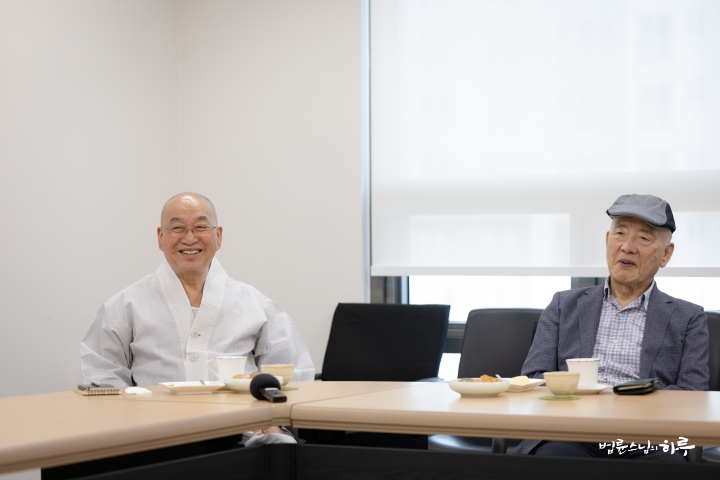
“When are you going abroad again, Sunim?”
“I’m leaving tomorrow night. Actually, I came to Korea briefly for this meeting.”
“Have a safe trip.”
After seeing off the religious leaders, Sunim headed to the Dharma Hall on the third floor.
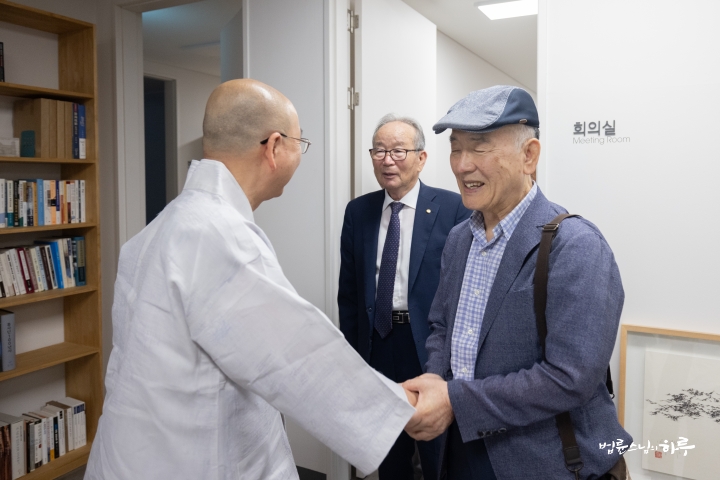
At 10 AM, with about 120 people gathered in the Dharma Hall, the Weekly Dharma Assembly began with the recitation of the Three Refuges and the Heart Sutra. Jungto Society members also participated online by joining the video conference room.
After watching a video about the weekly news of Jungto practitioners, the President of Jungto Society reported on the Youth Festival event to be held at the Jungto Social and Cultural Center in early November. They then watched a video together showing Sunim’s European lecture tour and Southeast Asian field trip over the past two weeks.
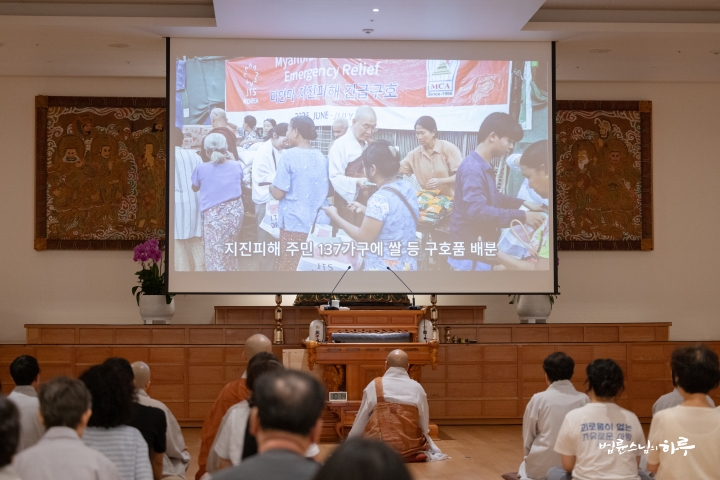
After the video ended, the assembly requested a Dharma talk from Sunim with three prostrations. Sunim began the Dharma talk by sharing the news that autumn swiftly arrived.
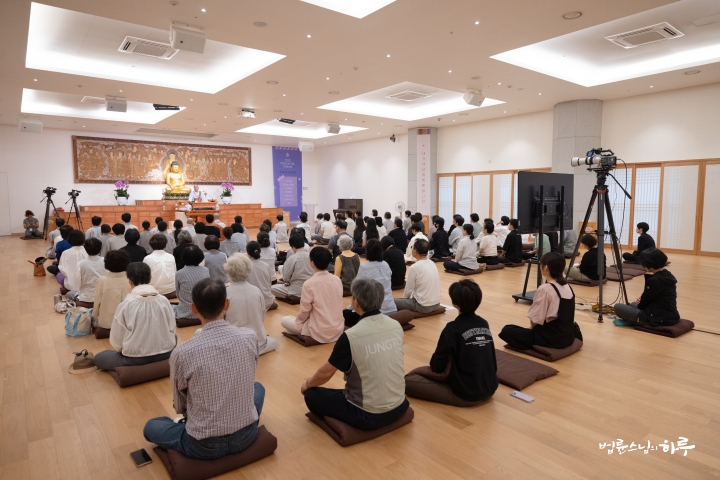
“While it’s still hot during the day, the heat has subsided in the mornings and evenings, and we can feel quite a chill. I returned to Korea yesterday and went straight to Dubuk Retreat Center. When I arrived at the farm and looked around, large chestnuts had already fallen in heaps along the field ridges from the chestnut trees. The rice in the fields was also bowing its head and ripening to yellow.”
“This morning, on my way to Seoul, I could feel the much colder morning air. There’s an old saying, ‘There’s no warrior who can defeat time.’ No matter how hot the summer, it retreats when autumn comes, and no matter how harsh the winter, it disappears when spring arrives. Life is the same. No matter how much one boasts of youth, wrinkles form before time, hair turns white, and steps slow down. Whether one is wealthy, a king, or a peerless beauty, no one can go against the flow of time.”
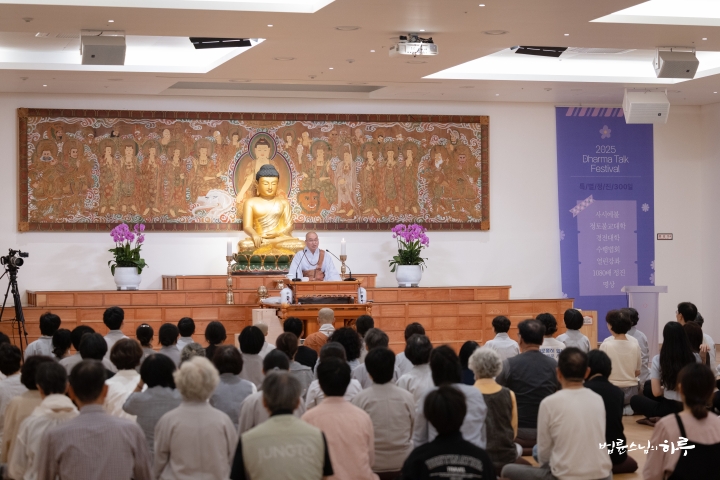
How to Live Life with Ease
In childhood, we eagerly counted down the days until New Year’s Day or holidays, and each day felt endlessly long. However, as we age, a year passes in the blink of an eye, and as we grow even older, our youth feels like yesterday, yet our hair has already turned gray and our steps have grown heavy. Looking back, everything is but a fleeting moment. When facing death and reflecting on life, we realize that even a hundred years of life is just a brief period that passes in an instant. Only then do we finally understand that everything that happened to us was really nothing significant.
If we could understand now that our current affairs will also seem insignificant when we look back, we could live life with more ease and happiness. However, we cling to each moment as it arises, suffering as if something terrible has happened, and often end our lives harboring resentment. While we view others’ problems as trivial, we treat even small matters that happen to us as if they were major crises. Looking back, they’re all minor issues, yet in the moment they feel as catastrophic as the sky falling. Therefore, when something happens, if we could view it as we would someone else’s situation or as we would when looking back later, we could live life with much more ease and fulfillment.”
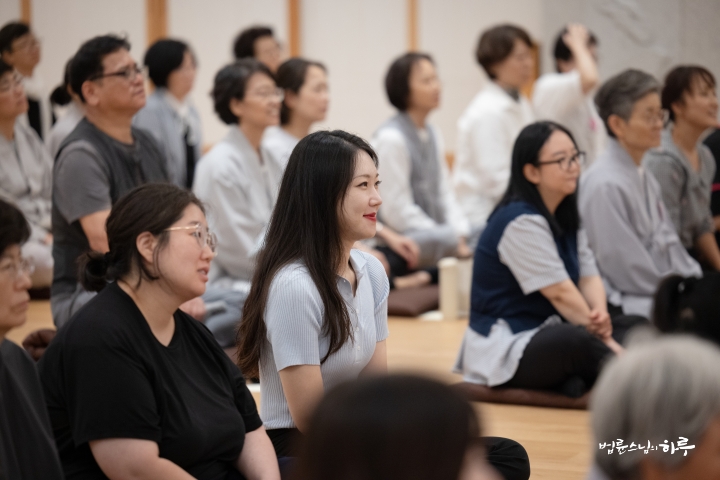
Sunim then talked about the chaotic situations in various countries around the world that he observed while touring Europe, and discussed what perspective practitioners should maintain while living in such circumstances.
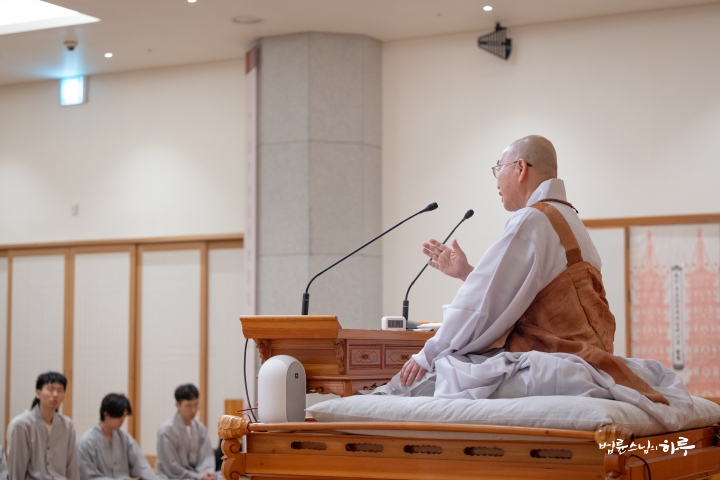
Sunim then took questions from those who had submitted them in advance. After two people asked questions online, one person raised their hand and asked a question from the audience. The last questioner requested a detailed explanation from Sunim, saying they didn’t quite understand the difference between awareness and enlightenment.
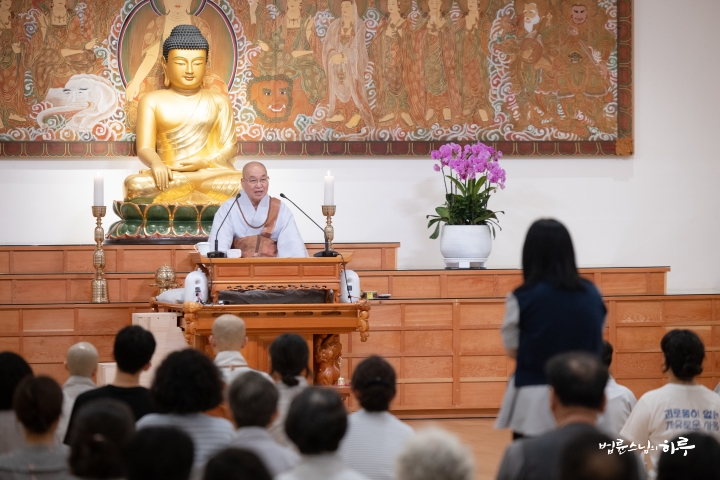
Can We Reach Enlightenment Through Awareness Alone?
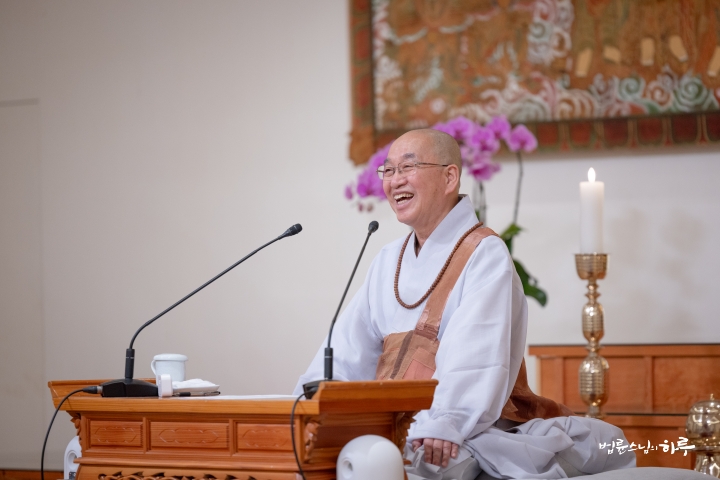
“Not knowing is called ignorance (無智) or avidya (無明) in Chinese characters. This ignorance is the cause of all suffering. It’s not because of past lives or because of God – suffering arises because we don’t know the cause. When a situation occurs and we don’t know ‘Why did this happen?’, that’s when feelings of injustice and suffering arise.
Ignorance can be broadly divided into two types. One is fundamental ignorance, and the other is momentary ignorance. Fundamental ignorance refers to a state of complete unawareness about something. On the other hand, momentary ignorance means that even though we have overcome fundamental ignorance and understood ‘Ah, this is how it is!’, in actual situations, that realization momentarily disappears and darkness returns. It is precisely at these moments that suffering arises.
Generally, when we speak of ‘enlightenment,’ we mean breaking through fundamental ignorance, and when we speak of ‘awareness,’ we mean escaping from momentary ignorance. However, both overcoming fundamental ignorance and overcoming momentary ignorance can be expressed as enlightenment in a broader sense.
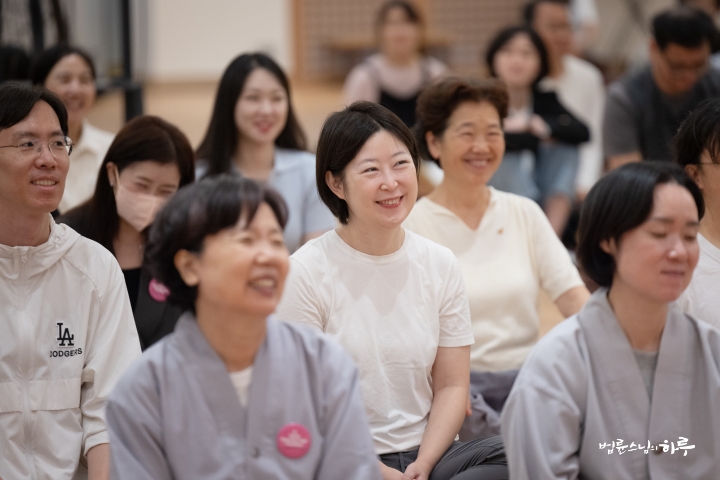
So, are the terms enlightenment and awareness equivalent? There are cases where awareness recognizes fundamental ignorance and cases where it recognizes momentary ignorance. In daily life, these terms are sometimes used together and sometimes used separately. When used together, awareness is enlightenment, and enlightenment is awareness. On the other hand, when distinguished, breaking through fundamental ignorance is called enlightenment, while recognizing momentary ignorance is mainly expressed as awareness.
Even after realizing fundamental ignorance, momentary ignorance still exists, so awareness must be maintained. Conversely, if awareness continues, one may realize their fundamental ignorance at some point. In this way, enlightenment and awareness can have both the same and different characteristics. To give an example of fundamental ignorance, we think “I exist.” This is because it feels like there is a self called “I.” The belief that “I exist” corresponds to fundamental ignorance. However, if through practice one experiences non-self by realizing “there is nothing that can be called ‘I,'” this can be called enlightenment.
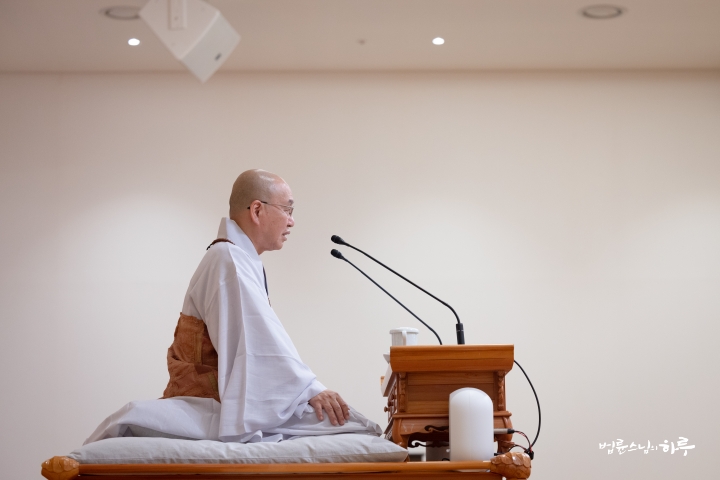
However, in the reality we see and experience with our eyes, we still find ourselves clinging to self-consciousness moment by moment. We get caught up in it without realizing. That’s why mindfulness in daily life is so important. Mindfulness means recognizing when ignorance has arisen, and through this process, we can free ourselves from ignorance even in our daily lives. Enlightenment and mindfulness can generally be understood in this way.”
“I understand well. Thank you.”
Questions continued to follow.
Among the four foundations of mindfulness, I’m curious about how we can practice mindfulness of dharmas in daily life.
If our suffering is due to karma, how can we distinguish between karma from past actions manifesting in the present and karma we create now that will manifest in the future?
After finishing the dialogue, it was time to conclude the Dharma assembly. Sunim announced that next week’s Weekly Dharma Assembly would be conducted online from the United States, and then concluded the assembly.
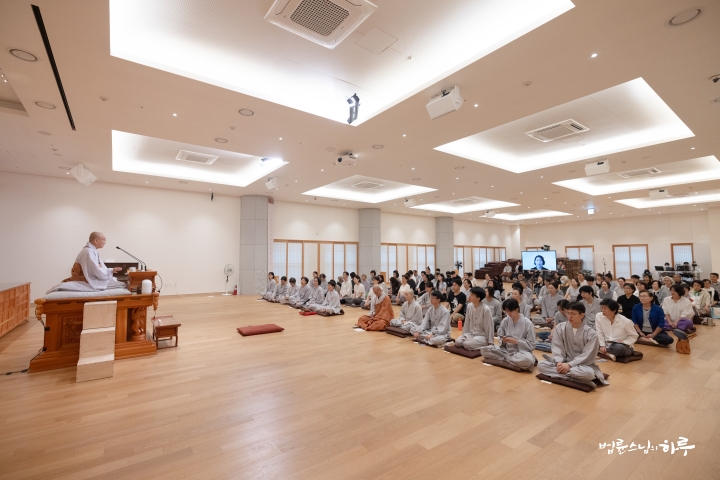
From 1 PM, Sunim attended a Peace Foundation research seminar held in the Peace Foundation conference room on the topic of “Fascinating Chemistry Stories in Daily Life.” Professor Jang Hong-je from the Department of Chemistry at Kwangwoon University gave an engaging lecture, emphasizing that chemistry is not a difficult subject confined to laboratories but is daily life itself, having developed alongside human civilization.
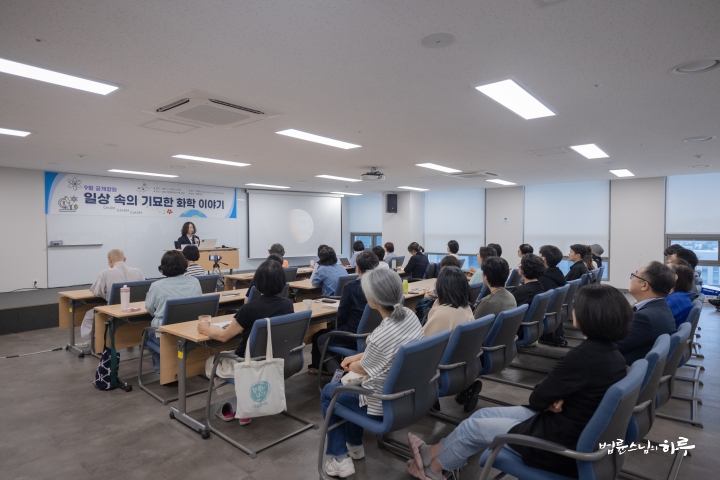
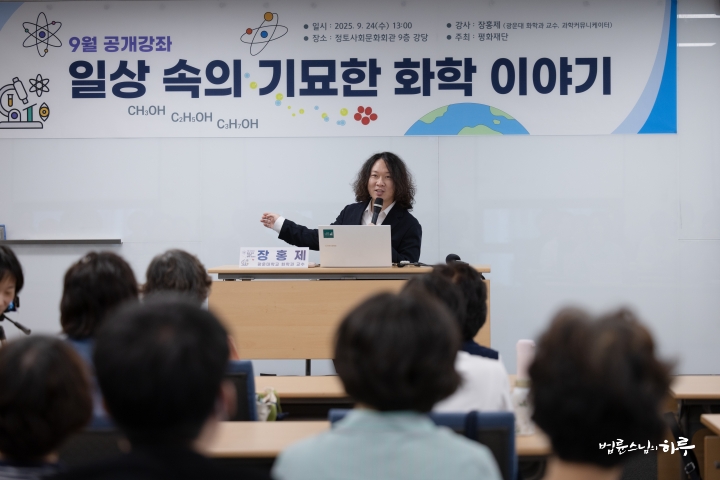
He explained that the Neolithic period, when humans began using fire, was the starting point of chemistry, and that chemistry has developed alongside human civilization through the Bronze Age to the current era of semiconductors and plastics. In particular, the background of plastic’s creation to save elephants and the history of petroleum use that began to save whales showed that chemistry started as a way to solve environmental problems. He also shared various stories ranging from the secret of Stradivarius violins to the chemistry behind the deaths of Mozart and Beethoven, and future energy technology using triboelectricity.
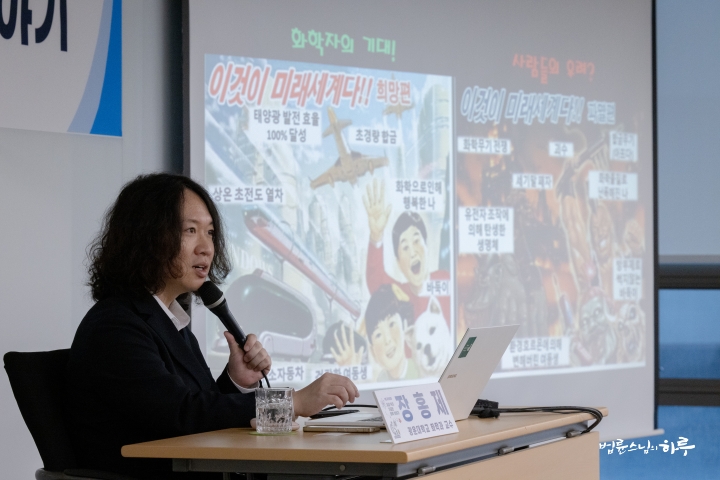
The professor explained that solutions to global warming are already scientifically possible. Technologies have been developed to make ethanol, gasoline, and even bread and meat from carbon dioxide in the air, and technologies to generate electricity from friction when walking and battery clothing have been realized. However, he noted that the reason these technologies are not actually implemented is due to lack of policy support, and concluded his lecture with the message that citizens’ interest and political will are needed to realize these solutions.
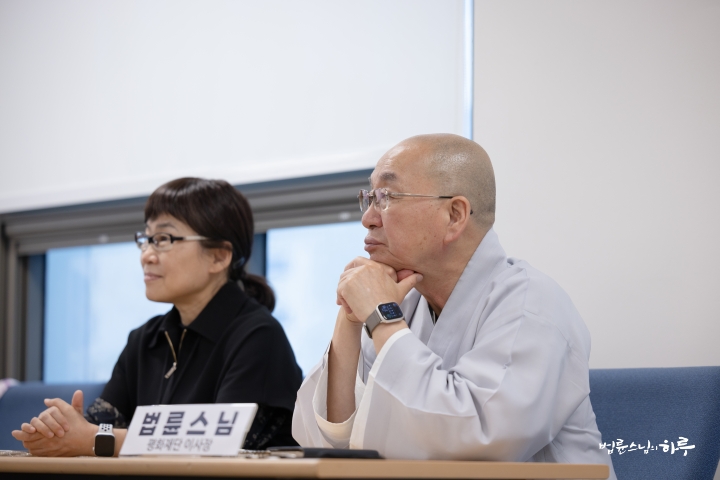
During the Q&A session following the lecture, various questions were discussed including the meaning and structure of the periodic table, how to verify the safety of chemicals used in daily life, the possibility of commercializing nuclear fusion power as a next-generation energy source, policies that civil society should demand for climate crisis response, and the chemical effects of alcohol on the human brain.
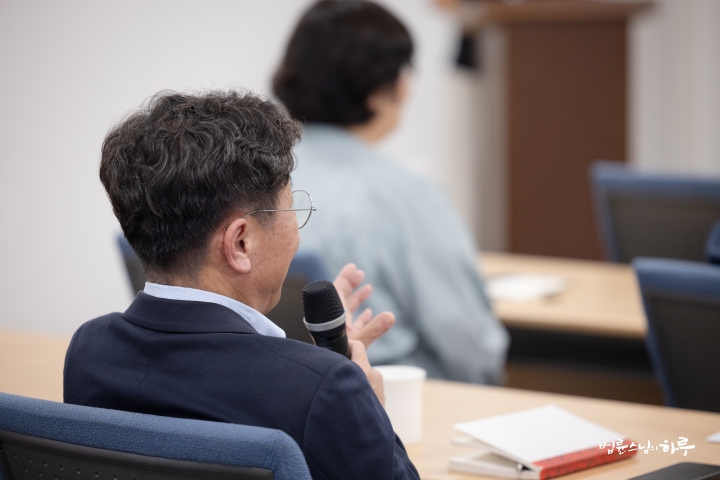
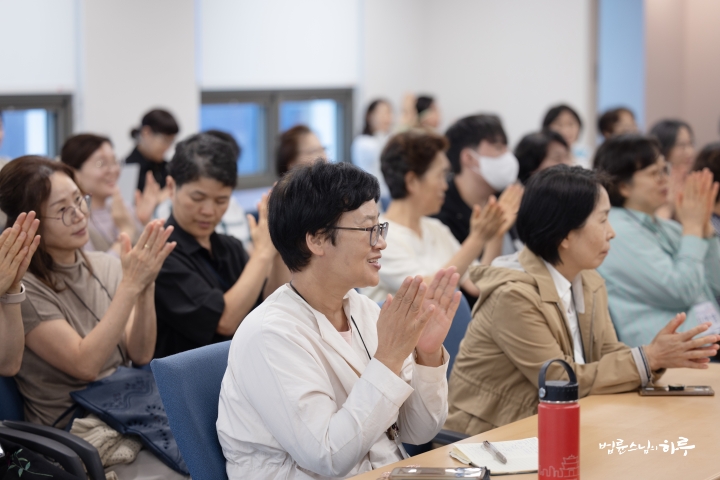
Sunim also listened attentively to the professor’s presentation for nearly three hours. It was a time to deeply reflect on the conveniences and problems brought by chemistry, and the directions for solutions.
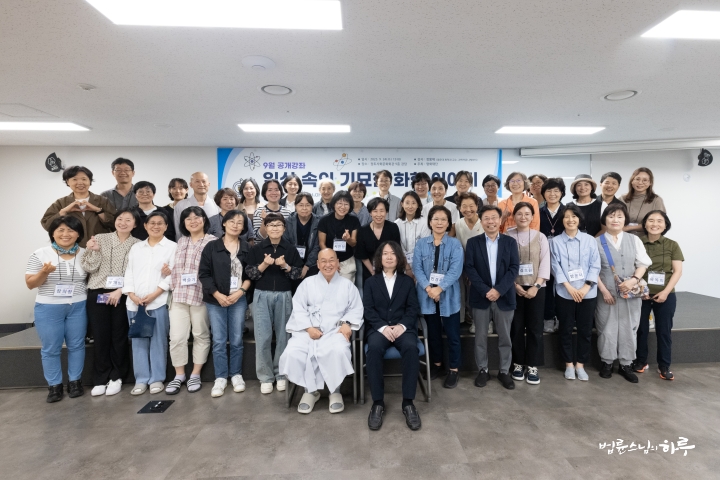
After taking a group photo with the audience, Sunim presented his book as a gift to Professor Jang Hong-je.
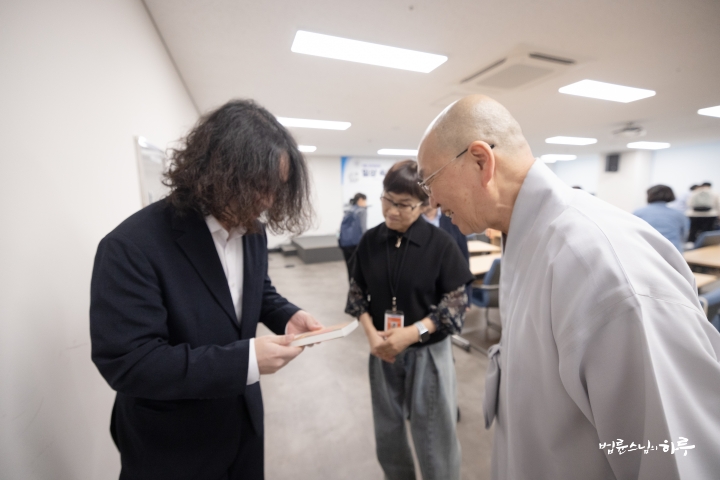
“I enjoyed your lecture. Thank you.”
“Thank you.”
Immediately after, from 4 PM, Sunim attended the Peace Foundation Planning Committee meeting. After examining the causes of young people’s increasing shift to the right and the current political situation in South Korea, they discussed the role of the Peace Foundation within this context for two hours.

As the sun set, at 7:30 PM, Sunim conducted a live broadcast of the evening Weekly Dharma Assembly. About 80 people gathered in the third-floor Dharma Hall, while Jungto Society members connected through online video conferencing. After watching videos introducing the Youth Festa event and showing scenes from the European lecture tour and Southeast Asian pilgrimage, they requested a Dharma talk from Sunim with three prostrations.
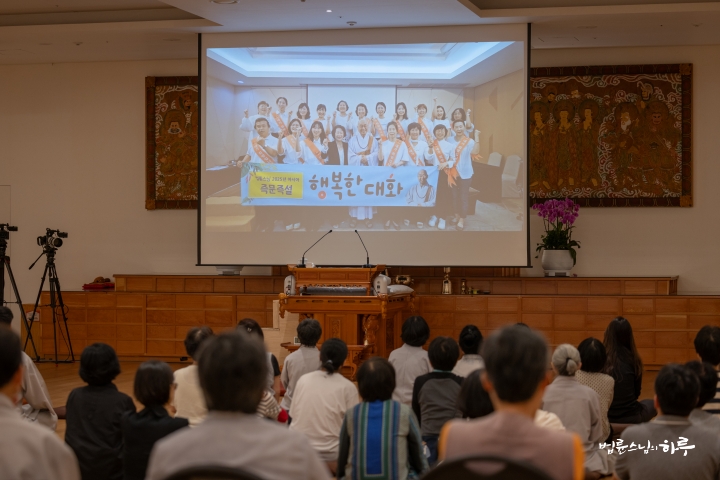
Sunim began the dialogue by first mentioning the current chaotic situation in the world and Korean society.
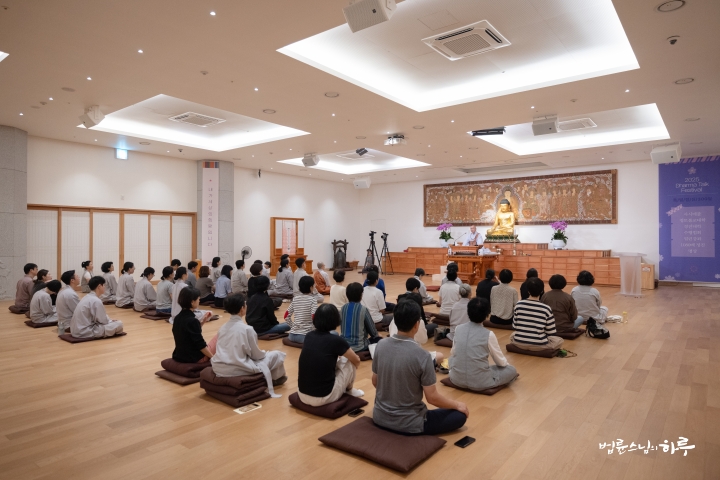
“I’ve just returned from Europe and Southeast Asia over the past two weeks. The world is a bit noisy these days. In developing countries, as the wealth gap widens, young people’s dissatisfaction is exploding, resulting in riots and regime changes occurring one after another. While there are no clear alternatives, this phenomenon is happening repeatedly in various countries. Even Europe, which is considered relatively stable, is noisy with internal conflicts. In Europe, which once championed progressive values, far-right parties are now ranking first in support in various countries. The world is engulfed in chaos everywhere.
Domestic politics is not much different. Looking at what’s happening in the National Assembly’s Legislation and Judiciary Committee, it’s like watching street thugs exchanging fistfights and curses. When encountering such scenes, I think we need to practice more to cultivate our minds and find equanimity. Practice doesn’t just remain at personal peace but can alleviate conflicts through mental equanimity and further bring about peace. Also, each small practice of living frugally becomes a meaningful action to protect the global environment.
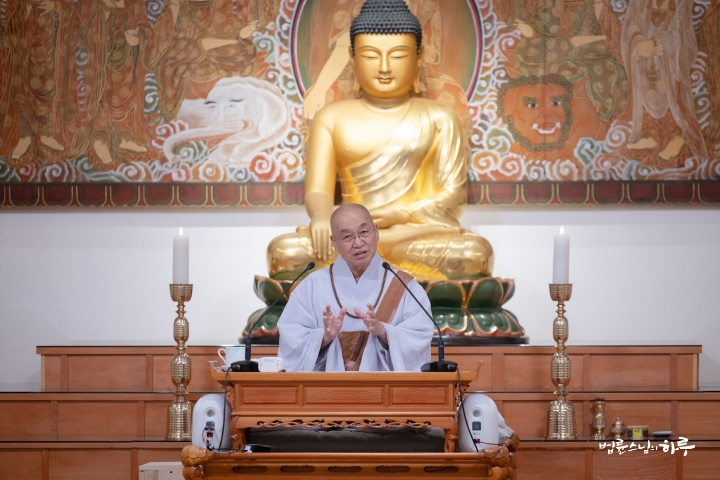
A World That Seems to Be Going Backward, Yet the Work We Must Do
However, reality shows that regardless of our efforts, conflicts and climate crises are intensifying, and wars and hatred are growing. At such times, we might wonder, ‘Is there really a need to continue these activities?’ But that’s not the case. We must not be attached to results or obsessed with short-term achievements. If it’s the right path, we simply move forward steadily. Success and failure cannot be measured by short-term evaluations of just a few years. Perhaps it will take decades or even centuries before we receive the assessment that ‘what we did then was the most correct path.’
After World War II, humanity reflected on many things. As a result, social justice and progressive values such as gender equality, liberation of weaker nations, abolition of class systems, and prohibition of racial discrimination became universally accepted. However, now we see signs of regression. Inequality is deepening rather than equality, and injustice seems to be taking hold over justice. Of course, we’ll have to wait and see whether these signs will lead to a major catastrophe like a world war, but looking at the current situation alone, it’s clear that human foolishness is being revealed.
We are living in this chaotic world right now. However, if we broaden our perspective and look back at the past, the current situation is better than times when wars were raging, and much better than the Middle Ages. Although it may seem like we’re regressing in the short term, in the long flow of history, this can be seen as part of humanity’s developmental process.
I visited Southeast Asia last week. Myanmar was suffering greatly due to the military regime, with ethnic minorities being bombed and numerous refugees being created. I also witnessed the reality that in poor countries, even basic education is still not properly provided. Seeing these situations makes us realize anew that there is so much work we need to do and so many ways we can help. If we only look at the negative aspects, we see many problems, but from another perspective, we can see that there is just as much that we can do.”
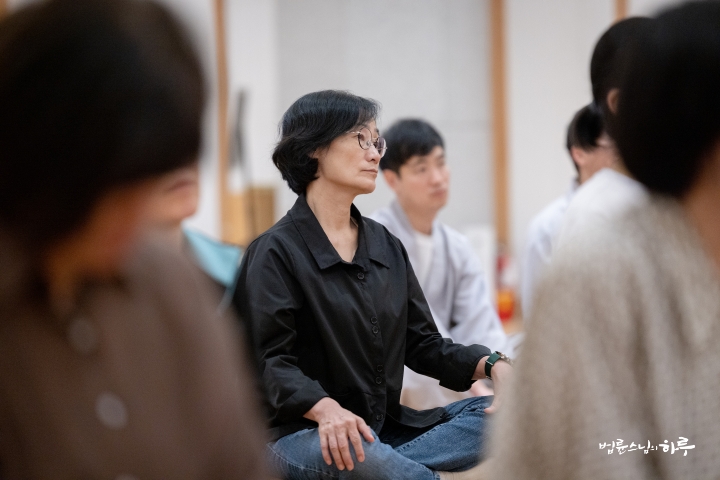
Next, the Dharma Q&A session began. First, someone from the audience raised their hand and asked Sunim a question.
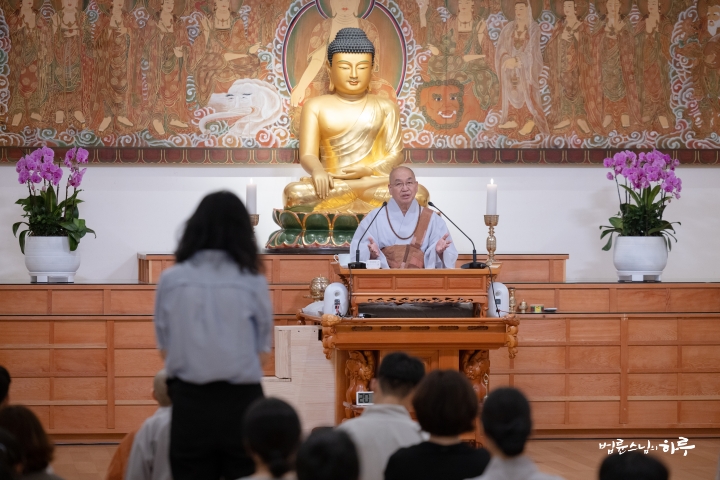
Why Does My Initial Earnest Heart Disappear Over Time?
“It’s good to hear that your mind improved through studying Buddhism. However, if you think that this good mind will continue forever without changing, that’s not a Buddhist perspective.
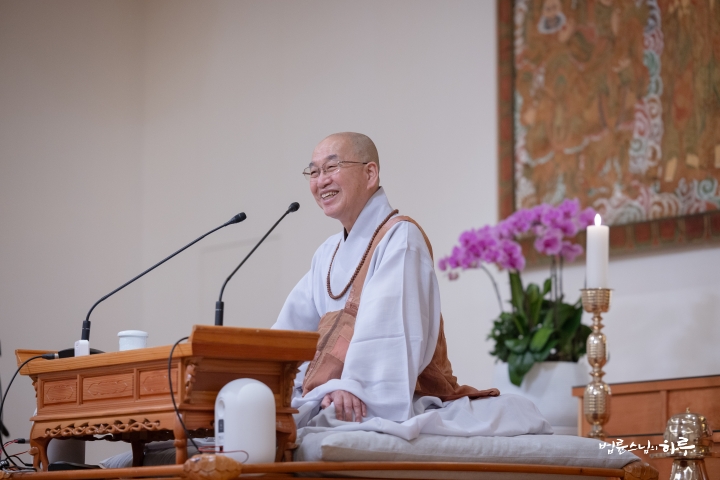
The essence of Buddha’s teaching can be simply stated as ‘all conditioned things are impermanent’ (諸行無常) and ‘all phenomena are without self’ (諸法無我). ‘All conditioned things are impermanent’ means that nothing remains unchanged. The universe follows the cycle of formation, abiding, destruction, and emptiness (成住壞空) – this is its true nature. Our bodies go through birth, aging, sickness, and death (生老病死), and our minds go through arising, abiding, changing, and ceasing (生住異滅). When a thought arises, it stays for a while, then disperses and disappears. As the old saying goes, ‘The mind when going to the bathroom is different from the mind when coming out.’ The mind changes back and forth like boiling porridge. Therefore, the mind cannot be trusted. When you feel good, you might think, ‘I wish this feeling would last forever,’ but that’s not the Buddha’s teaching. It’s human nature for moods to fluctuate between good and bad.
Right now, a good mind has arisen, and right now, an unpleasant mind has arisen – that’s all. So don’t be attached to it. The mind just goes back and forth. When you understand this, you won’t be greatly affected whether your mind feels good or bad, and as a result, your mind becomes peaceful. You won’t get excited when good things happen, and you won’t sink when unpleasant things happen. A good feeling arises only momentarily, and an unpleasant feeling also arises only momentarily.
When walking on a path, there are flat areas, mountain trails, streams to cross, forest paths, and paths under the scorching sun. The mind is the same – various phenomena just arise. When you’re not bound by these, equanimity is maintained. If you think that once you’ve made up your mind it will stay that way, that’s a mistaken thought. When you attended the Dharma School, a good mind arose, but when you face difficulties, that mind may disappear. The mind is always a phenomenon that goes back and forth. When you understand this, you won’t be easily shaken by moods or states of mind.”
“But I want to return to that state of mind.”
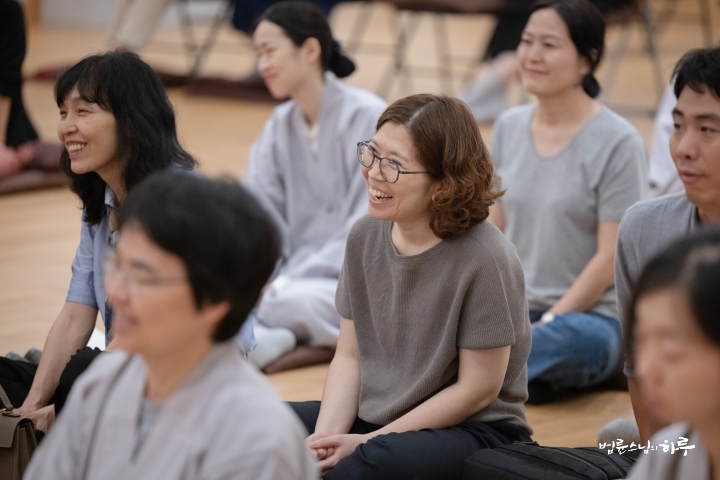
“That thought itself is wrong. That mind has already passed and doesn’t exist in this present moment. If a depressed mind arises now, just be aware: ‘A depressed mind is arising.’ If a joyful mind arises, just be aware: ‘A joyful mind is arising.’ If an uncomfortable mind arises, just be aware: ‘It’s uncomfortable.’ In fact, minds like ‘uncomfortable,’ ‘joyful,’ or ‘dislike’ are not essentially important. Just as trees flash by when you look out the window of a moving car, the mind also just arises and disappears like that.
When you can see it this way, you won’t be too attached to reality. You’ll do your best in whatever you do, but won’t be attached to the results. For example, when running a store, some days there are many customers, some days few. Some months you make a profit, some months you take a loss. Stocks also rise and fall, don’t they? When making friends, some are helpful, others cause harm. Various things always happen in the world, and the mind also arises in various ways. Not considering these important or being attached to them is the Buddha’s teaching. When you reach this state, you can be at peace no matter what happens.
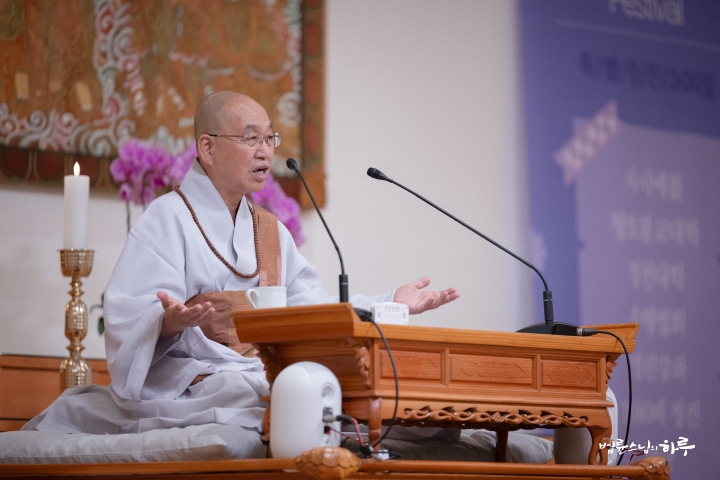
From that perspective, you have studied Buddhism incorrectly. Feeling good after reading scriptures is no different from feeling good after having a drink. That’s just a feeling, not the essence of the Buddha’s teachings. The Buddha’s teachings are about transcending good and bad.
Feeling happy after coming to the temple and listening to a Dharma talk is actually the same as feeling happy from making money or meeting someone nice. Later, if the man doesn’t meet your expectations, you might suffer for life because of that initially good connection. Similarly, when opening a store, you might be happy at first but later suffer because you can neither sell it nor maintain it. These are not examples of studying the Dharma correctly but are merely phenomena arising from attachment.”
“After becoming a member of Jungto Society, I felt I shouldn’t live with depression or anxiety. So I had an attachment to maintaining a happy mind through prayer. As Sunim said, I will study again that whether I’m happy or sad, it just passes by like trees passing by when a car drives past. Thank you.”
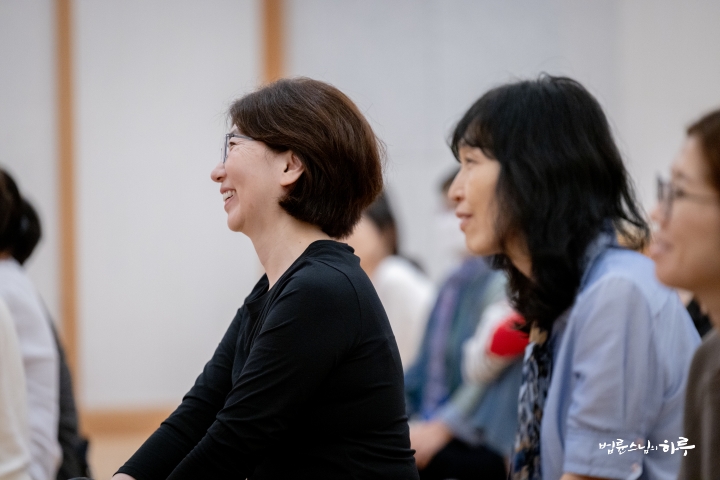
Then, two people asked Sunim questions online and had conversations with him.
I’ve been self-employed in construction and architecture for 20 years and am currently taking a break. I have many concerns about how to live going forward.
Seeing President Trump’s coercive attitude and Russia, China, and North Korea meeting, I’m anxious that a world war might break out.
After finishing the conversations, it was almost 9 PM. The members of the Sangha sat in circles by group for mindful sharing, while Sunim left the Dharma hall and headed to the reception room at the Peace Foundation.
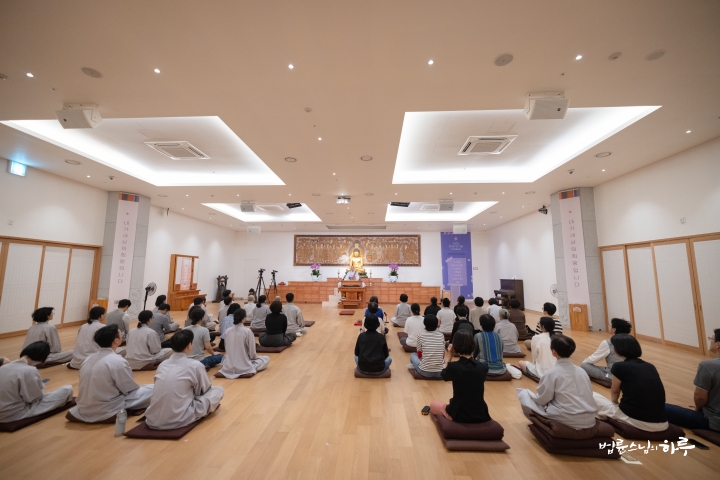
From 9 PM, Sunim received a report from Venerable Yusu and the head of the Special Youth Division, who are preparing for the Youth Festa event, and held a meeting about contentious issues. Since it’s a major event where 10,000 young people will visit the Jungto Social and Cultural Center over three days from November 7 to 9, there were many things to prepare in advance. After thoroughly reviewing detailed programs and safety issues for an hour, the meeting concluded.
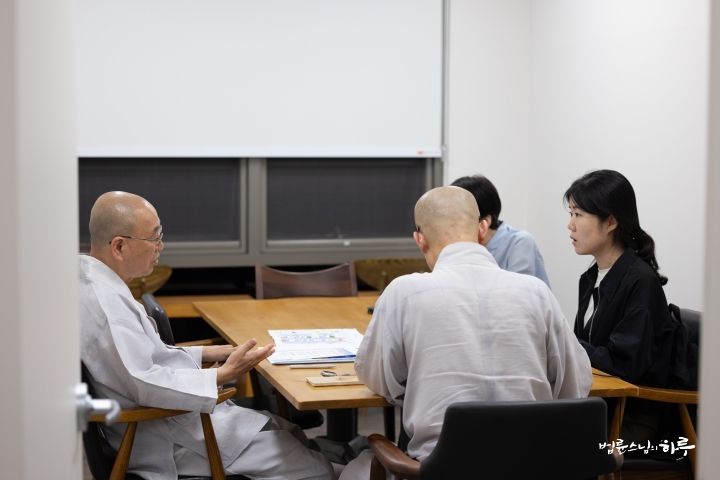
Tomorrow, Sunim will have an early morning breakfast meeting with North Korea experts at the Peace Foundation, meet with foreign affairs and security experts in the morning, discuss preparations for inviting Bhutanese officials to Korea with the JTS Secretary-General in the afternoon, and depart for the United States in the evening for a lecture tour of the East Coast of North America.






“..the background of plastic’s creation to save elephants and the history of petroleum use that began to save whales showed that chemistry started as a way to solve environmental problems.” Weren’t they both intended to solve the problem of material scarcity?
Perhaps it’s an issue with the English translation, but there seems to be a claim that in those times manufacturing industries were concerned about elephants and whales. And an even less credible claim that we can associate the production of plastics and petroleum with solutions to environmental problems.